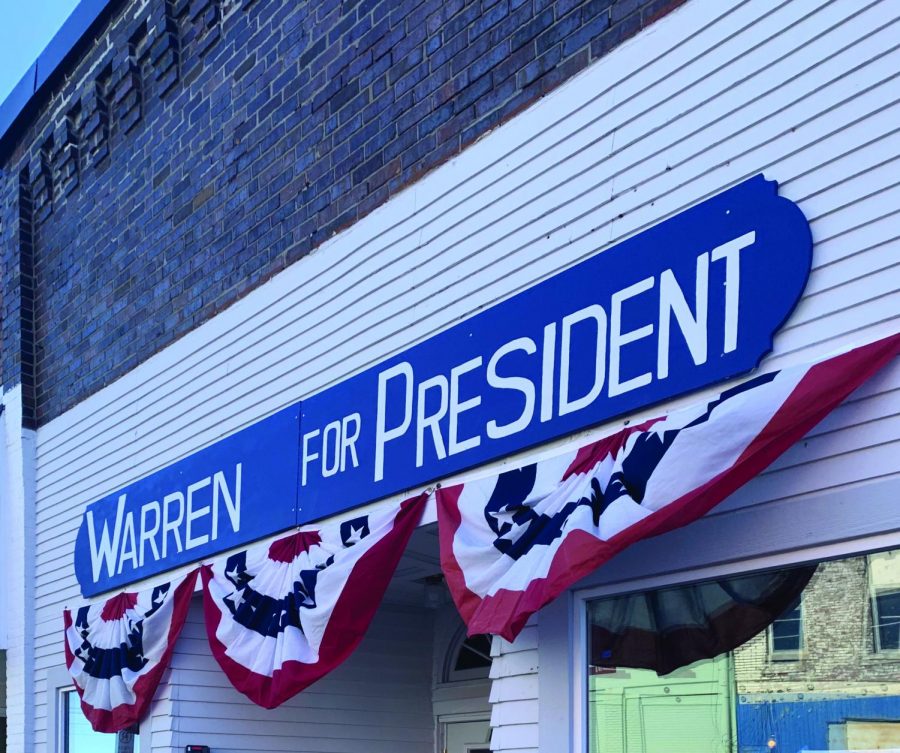Family Affair: Progressive students struggle with moderate family members back home
Isabelle Sarraf/ The Daily Northwestern
Campaign office for U.S. Sen. Elizabeth Warren (D-Mass.) in Indianola, Iowa.
March 4, 2020
In all four early contests in the 2020 Democratic Primary, U.S. Sen. Bernie Sanders (I-Vt.) was the decisive favorite among young people age 17-29.
Since his 2016 presidential run, young voters have been an integral part of the Sanders coalition and have stuck with him in 2020. His popularity among that cohort serves as a weakness for more moderate candidates such as former Vice President Joe Biden, who is more popular among older voters.
This division along generational lines is one of the most notable in the Democratic primary. In households with multiple generations of Democratic voters, there is often disagreement between the more progressive younger generation, which includes many Northwestern students, and their more moderate parents.
Many Northwestern students who favor a progressive ideology are experiencing the direct impacts of this divide within their families. Medill junior Jack Daleo said he would support either Sanders or U.S. Sen. Elizabeth Warren (D-Mass.) in the primary, favoring them for their progressive agendas.
“The moderate candidates aren’t going to make anything happen,” Daleo said. “It’s the way the country’s been going for years. We need to see some actual change happening in this country.”
Daleo, who described himself as the most liberal person in his family, said his parents disagree with his support of progressive candidates, favoring moderate candidates including Biden. He said his father encouraged him to vote for Biden and was skeptical of progressive policies that seem “too extreme” and “will never happen.”
Noel Buonomo, a Medill sophomore who has written for The Daily, said she sees a “generation barrier” in the way her relatives view climate change — an issue important to younger voters.
She said she plans to vote for Sanders in the primary while her parents will most likely not vote in it.
“The older members of my family tend to be more conservative,” Buonomo said. “It does really bother me that we hold such different beliefs, especially on issues like reproductive rights and climate change, because it does directly affect me and my generation.”
The generational divide as displayed in the recent Democratic primaries, however, goes beyond what policies impact which generations.
Weinberg freshman Matt Norambuena said though he agrees with Sanders on issues of health care, education and climate change, the reasons he voted for him were more personal.
“Most establishment politicians end up compromising to something that doesn’t really alter the status quo, and they take money from all these corrupt organizations,” Norambuena said. “Bernie has stayed true to his values. I know that he’s authentically himself, and he’s not going to let anyone influence him.”
Norambuena said though his parents align policy-wise with Sanders, they were hesitant to support him because they are “less hopeful” for the changes that can be made in the future.
He said when he discusses politics with his parents, they call him idealistic, and they see Sanders as less electable than a more moderate candidate. Norambuena disagrees with them by pointing out that young people will be less likely to vote at all if they do not have the option to vote for a candidate that offers something new.
“The more liberal candidates are more focused on revolutionary change,” Norambuena said.“So are young people. Older people are less willing to accept that, because they haven’t seen change.”
Email: [email protected]
Related Stories:


